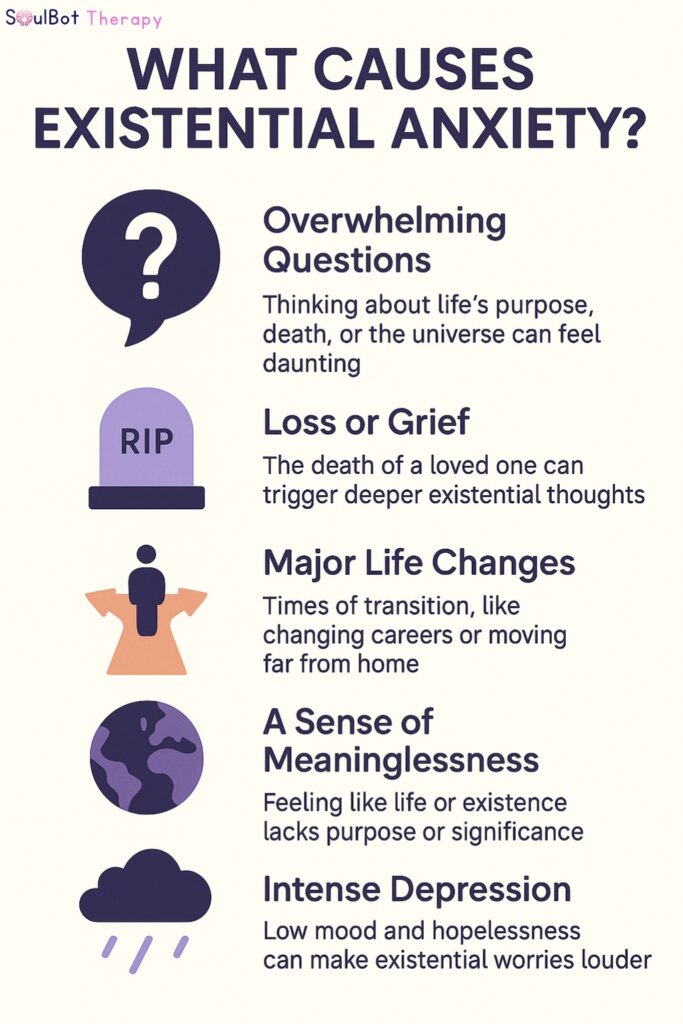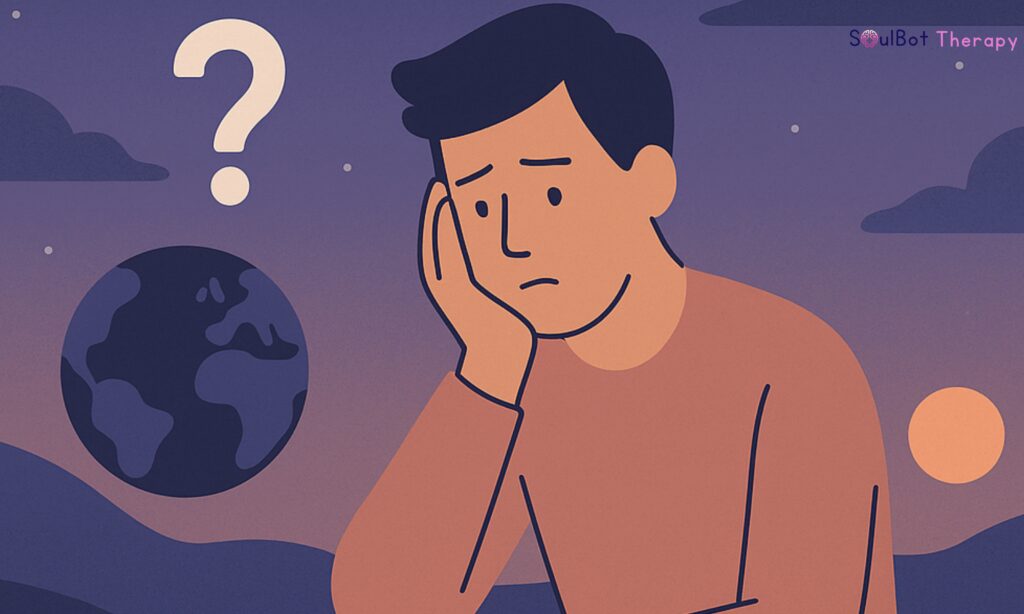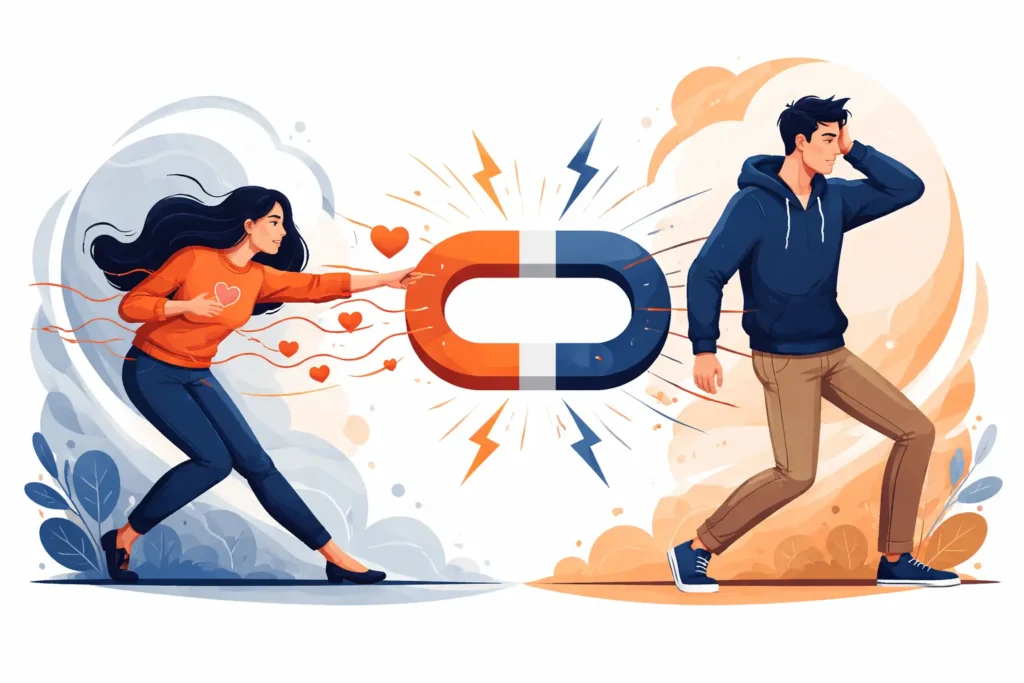What Is Existential Anxiety and Why Does It Feel So Heavy
Some nights, you’re not just tired, you’re spiraling. Why am I here? What’s the point? What if none of this matters?
That’s not just overthinking. That’s existential anxiety.
It’s the type of anxiety that kicks in when you start questioning your existence, purpose, identity, or mortality. It’s a slow-burning unease that can show up during quiet moments or after significant life events. And it’s more common than you think.
What Causes Existential Anxiety?
Here’s the thing: this isn’t about one trigger. It’s usually a mix of internal questions and external shifts. Some common causes:
- The death of a loved one
- A serious illness or health scare
- Losing your job or ending a relationship
- Global events that shake your sense of safety
- Hitting milestones that force reflection (turning 30, 40, 50)
This is where mental health and existentialism collide. Your mind starts reaching for meaning, and when it can’t find it, panic creeps in.
🧠 SoulFact: As Psychology Today explains, people who feel their life lacks meaning tend to experience more distress and lower emotional resilience compared to those with a strong sense of purpose.

How Existential Anxiety Feels in Daily Life?
You might not walk around saying, “I’m experiencing existential dread.” But it shows up in subtle, sticky ways:
- Constant questioning of life choices
- Feeling emotionally numb or detached
- Inability to enjoy things that once felt fulfilling
- Obsessive thoughts about death or the future
- A sense of disconnection from yourself and others
This isn’t about being dramatic; it’s about your brain trying to process life’s biggest unknowns. You’re not broken. You’re awake.
Real Ways to Cope with Existential Anxiety
Let’s get practical. You can’t “solve” life’s big questions, but you can find ways to live with them without falling apart.
1. Ground Yourself in Identity
Try journaling with prompts like:
- What do I value most?
- What kind of life feels meaningful to me?
- What parts of my routine feel misaligned?
Use tools like the Personality Type Indicator Test on SoulBot to reconnect with who you are outside of labels.
2. Start an Existential Journal
Track your thoughts, don’t filter, and let your big questions spill out. This will bring emotional clarity and help untangle spirals.
3. Practice Micro-Mindfulness
Focus on one small, present thing each day: a walk, your breath, the way tea feels in your hands. It won’t solve the universe, but it will calm your nervous system.
4. Talk It Out Even to an AI
You don’t always need a therapist on call. Tools like SoulBot provide structured mental health support when you’re too overwhelmed to call someone. It listens, reflects, and holds space without judgment.
5. Redefine “Meaning”
Instead of chasing a grand purpose, try this:
What makes me feel connected, alive, or curious?
That’s the meaning. Build around it.
🧠SoulFact: According to the APA, existential fears like death, isolation, and meaninglessness often surface during major life transitions and can trigger or worsen anxiety and depression.
When to Worry (And Get Help)?
Existential anxiety can tip into clinical anxiety or depression when left unchecked. If you’re feeling hopeless, struggling to get out of bed, or having dark thoughts for more than two weeks, talk to a licensed therapist.
Final Thought: The Goal Isn’t Clarity, It’s Connection
You may never find all the answers. But you can find meaning in the asking. You can ground yourself in values, not certainty. And you can feel less alone in the process.
Because here’s the truth: existential anxiety is part of being fully human.
🧠 Explore Your Emotional Blueprint
Take the Emotional Intelligence Test and get insights that bring clarity to your inner world.
💬 Talk to SoulBot – Your AI Therapy Companion
Judgment-free mental health support built for reflection, growth, and those quiet 2 a.m. spirals.
🕵️Related Soulbot Reads
- Liminal Anxiety: Navigating Life’s Uncertain Phases
- Digital Burnout: How Constant Notifications Fuel Anxiety
- What happens in CBT for Sexual Identity Anxiety?
- CBT Techniques for Anxiety: 5 Ways to Calm Your Mind
- How to Break the Cycle of Sleep And Anxiety?
- Social Anxiety: Understanding and Overcoming It
- Mindfulness for Anxiety: Techniques That Actually Help
- What Triggers Anxiety? How to Recognize and Handle It
- What Is Anxiety: Signs, Causes & How to Deal With It?
- How does Anxiety effects on Daily Life?
- What Anxiety Feels Like?
- How To Overcome Anxiety And Fear?








